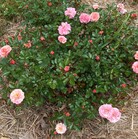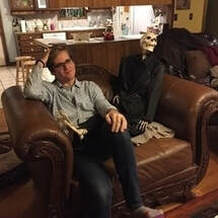Sacred Chickens
Menu
SACRED CHICKENS
 Gardening During Covid by Jarad Johnson If you know anything about Julie and Jarad, it’s that they love plants. In fact, they are plant obsessed. So, what did they do during quarantine? They gardened. They planted, and they dug around in the soil to find some sanity in an otherwise topsy turvy world. Good grief, this time last year, we feared for our democracy, were sheltering in place, seeing people in masks felt apocalyptic instead of normal, and everyday the news reported more and more death from a virus with no vaccine and seemingly no end. We lived (and live) in dark times. The only solution the two of them knew was to garden. It’s a source of solace, a cure for depression, and provides a sense of fulfillment. And of course, there was plenty of time to do it. Jarad had just graduated (without a ceremony, just to set the scene. Also, he’s still complaining about it. Sigh.) Adjusting to being back at home, and already having a few smaller beds to work with, he set to, “renovating,” his mother’s yard. By that we mean he created seven large flower beds and took considerable amounts of sod away to the woods. Characteristically, he did not consult her on this. Seeds were flung in every direction. A symbol of hope, in a time when there wasn’t much to go around. Plants shot up in every direction. Plants were also bought in great number, from a safe distance, of course. An obsession, while already formed, was nurtured in the form of great clods of dirt flung through the air to make way for zinnias, sunflowers, clematis, and all manner of growing things. Julie also planted and plowed (and bought plants – dear lord, did she buy plants. She’s lucky her bank card didn’t melt. She’s typically less manic than Jarad but she found herself not only mourning the state of the world but her small farm in Fayetteville after a move to the Atlanta suburbs. Apocalypse and loss crashed over her in one great wave and the only life boat she knew was a garden. When things are bleak, gardens are for hiding and hoping. She threw out seeds, dug up plants, replaced plants made new beds, and created beds, as we all did. She created pathways, laid mulch and got some raised beds for her vegetables. She got a permit for some chickens and put up a fence. As usual, they both gardened in their own particular idiom – enjoy a garden and you have the essence of a gardener’s soul. Jarad threw everything and anything he could fine everywhere, especially unusual seeds, following his heart and adding specific plants, whereas Julie planted in waves of apricot and purple, threading other colors in-between. There is something fundamental about our connection to the earth and the soil we walk on. It puts into perspective that we are a part of the cycle of the planet and gives a sense of fulfillment that is hard to put into words. It restores order, reminding us that the trees will bloom in spring become bare again in the fall, no matter how bad things get. Planting a tree is a nod to the idea that we can start a relationship with the future that may last beyond our physical bodies. And it gives the gardener something to do, something tangible and concrete to point to when things get dire. In essence, it is fundamental to their lives. Asking the two of them not to commune with the natural world is like asking others not to breathe. The word nurture comes to mind. Many people nurture their bodies with healthy food and exercise. People nurture children, animals, perhaps a houseplant or two. But what about the spirit? In our capitalist society that dwells only on the physical, nurturing the essence of ourselves can seem a bit…. out there. But that is what gardening does. It nurtures and connects to something other than the material. Something almost primal, a need some of us have to watch the growing things and to learn the ways of the plant world. Solace is a word closely related to nurture, and what does it mean? Contentment, peace of mind, stress relief, even. Think about where people find these things. Some people buy things that they don’t really need, falling into the cycle of endless consumerism. Some, unfortunately, seek it in substance abuse, and perhaps still sadder, some drift through life in an endless sea of melancholy and discontent. What sad, depressing lives many people live, trying to live up to society’s expectations and squeezing and morphing themselves to fit that mold. Julie and Jarad approach things a bit differently. They seek solace in the voices of the trees and plants, in the sprouting seeds in the spring and in laying the garden to rest in the winter. They walk alone in the woods, and listen to wild voice of the earth, in all its myriad tones. In many ways, once you start to become a plant addict, your perspective shifts. No longer do the petty concerns of society lay so heavily upon you. You are lighter and more in tune with the truth that modern society chooses to ignore- we are a part of nature. We do not own it, nor are we above it. It has existed and evolved long before us and will be there to accept us back into its arms once we pass over into whatever lies after death. So, when people hear the gardening is an important part of their lives, on the surface it can seem silly, given the modern perspective. But, once you begin to consider the question, it seems much sillier to live in a world where the natural world is not acknowledged or respected. In fact, we have removed ourselves so far from it that the natural world seems separate from our own. We must change this. The first step is to interact with the plants around you and to respect the world that has been here long before our fabricated one.  Bio: Jarad recently graduated from college at MTSU, loves tea and coffee, and tries to spend every spare second reading. He has been a fervent gardener for 6 years and is fascinated by all related topics and has spent the last several years writing about this passion. He believes that nature is our greatest teacher. He majored in English with a concentration in literature and plans to pursue and master’s degree in Ecocriticism.
0 Comments
Leave a Reply. |

Click Photo above to buy ebook or paperback from Amazon.
Here's the link to Barnes and Noble Or order through your favorite independent bookstore! Categories
All
|
 RSS Feed
RSS Feed